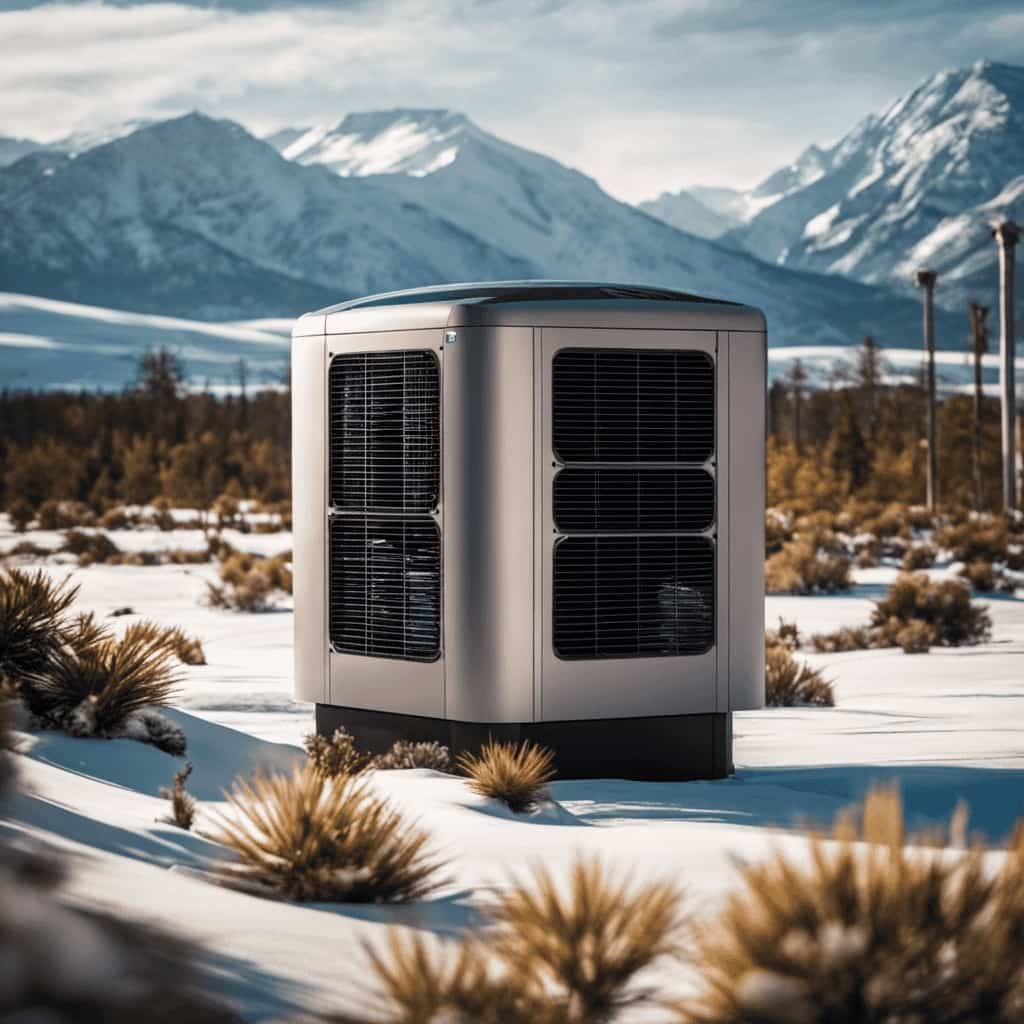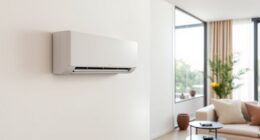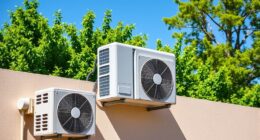We have been searching for the most efficient heat pump for our HVAC system. Come along with us as we delve into the factors that impact energy efficiency, the various types of heat pump systems on the market, and the significance of SEER and HSPF ratings.
We’ll also share tips for improving efficiency and compare heat pump performance in various climate zones. Get ready to liberate your HVAC system with our comparative guide on heat pump energy efficiency.
Key Takeaways
- Factors affecting heat pump efficiency include climate zone, insulation, size of the heat pump, and type of refrigerant used.
- Heat pump efficiency is important for energy savings, cost savings, environmental impact, comfort and temperature control, and longevity of the heat pump.
- In heating mode, factors that affect heat pump efficiency include COP, HSPF, heating capacity, heat pump defrosting, and auxiliary heating.
- In cooling mode, factors that affect heat pump efficiency include SEER, cooling capacity, dehumidification capability, airflow optimization, and variable speed technology.
- Heat pump efficiency can vary in different climate zones, with considerations for cold climate efficiency, moderate climate efficiency, and hot climate efficiency. Dual-fuel systems and geothermal heat pumps are also options to consider.
Factors Affecting Heat Pump Energy Efficiency
As we delve into the topic of factors affecting heat pump energy efficiency, it’s important to understand how various factors can impact the performance of these HVAC systems. Two key factors that greatly influence heat pump energy efficiency are proper heat pump maintenance and accurate heat pump sizing.
Firstly, regular heat pump maintenance is essential for optimal efficiency. This includes cleaning or replacing air filters, inspecting and cleaning coils, and ensuring proper lubrication of moving parts. Neglecting maintenance can result in decreased efficiency and increased energy consumption.

Secondly, correct heat pump sizing is crucial for energy efficiency. An undersized heat pump will struggle to meet the heating or cooling demands of a space, leading to longer run times and higher energy usage. Conversely, an oversized heat pump will short-cycle, resulting in frequent starts and stops, which wastes energy.
Types of Heat Pump Systems for HVACs
We will now explore the various types of heat pump systems available for HVACs.
When it comes to heat pumps, there are two main types to consider: ductless and centralized heat pumps.
Ductless heat pumps, also known as mini-split systems, consist of individual indoor units connected to an outdoor unit. They’re ideal for heating or cooling specific areas of a home or building.

On the other hand, centralized heat pumps utilize a centralized unit that distributes heated or cooled air through a network of ducts.
Another important distinction to make is between geothermal and air source heat pumps. Geothermal heat pumps utilize the stable temperature of the earth to exchange heat, while air source heat pumps extract heat from the outside air.
Understanding these different types of heat pump systems is crucial in determining the most suitable option for your HVAC needs.
Now, let’s delve into the next section to explore the importance of understanding SEER and HSPF ratings in heat pumps.

Understanding SEER and HSPF Ratings in Heat Pumps
To fully grasp the efficiency of heat pumps, it’s important to understand the Seasonal Energy Efficiency Ratio (SEER) and Heating Seasonal Performance Factor (HSPF) ratings. These ratings measure the energy efficiency of heat pumps and can help consumers make informed decisions when purchasing HVAC systems.
SEER measures the cooling efficiency of a heat pump by dividing the cooling output in British thermal units (BTUs) by the electrical energy input in watt-hours. The higher the SEER rating, the more efficient the heat pump is in cooling mode.
HSPF, on the other hand, measures the heating efficiency of a heat pump by dividing the heating output in BTUs by the electrical energy input in watt-hours. Similar to SEER, a higher HSPF rating indicates a more efficient heat pump in heating mode.
Understanding these ratings is crucial in selecting a heat pump that aligns with your energy-saving goals. By choosing a heat pump with higher SEER and HSPF ratings, you can maximize energy efficiency and reduce your carbon footprint.
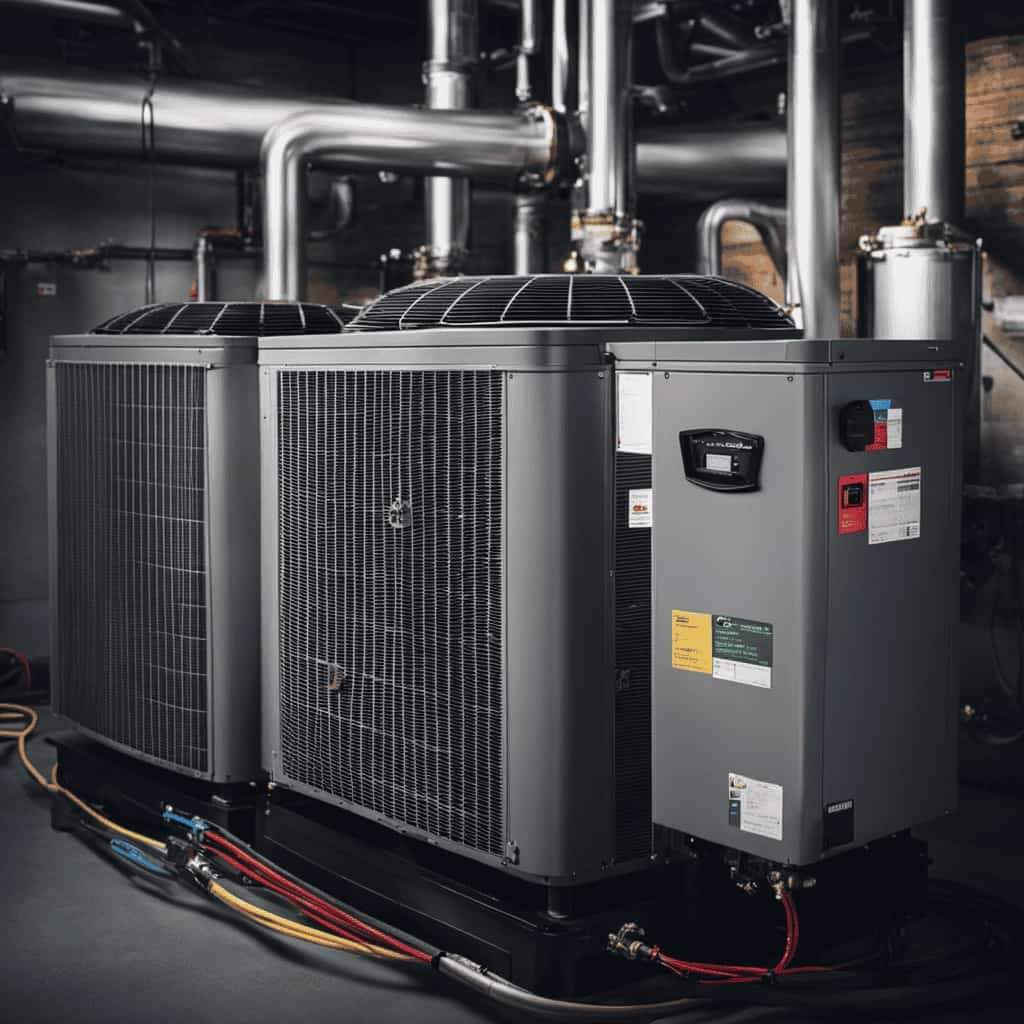
Tips for Improving Heat Pump Energy Efficiency in HVAC Systems
To increase heat pump energy efficiency in HVAC systems, we should regularly clean and replace air filters. This simple maintenance practice can significantly improve the performance of the heat pump and reduce energy consumption.
In addition to cleaning and replacing air filters, there are several other energy-saving techniques and maintenance practices that can further enhance the efficiency of the HVAC system:
- Regularly inspect and clean the coils to remove dirt and debris.
- Ensure proper insulation in the building to minimize heat loss or gain.
- Seal any air leaks in the ductwork to prevent energy wastage.
- Schedule annual maintenance by a professional technician to optimize the system’s performance.
Implementing these energy-saving techniques and maintenance practices can’t only improve the heat pump’s energy efficiency but also extend its lifespan.
Now, let’s move on to comparing heat pump efficiency in different climate zones.

Comparing Heat Pump Efficiency in Different Climate Zones
Comparatively, heat pump efficiency varies in different climate zones, so it’s important to consider the specific requirements of each region.
In commercial buildings, heat pump efficiency plays a crucial role in maintaining comfortable indoor temperatures while minimizing energy consumption. The efficiency of heat pumps can be significantly influenced by the level of insulation in a building. Well-insulated buildings help to minimize heat loss in colder climates and reduce heat gain in hotter climates.
This means that in colder regions, where the demand for heating is high, a heat pump with higher efficiency is preferred. On the other hand, in hotter regions, where cooling is the primary concern, a heat pump with superior cooling efficiency is more desirable.
Understanding the impact of insulation on heat pump efficiency is essential for maximizing energy savings and achieving optimal performance in different climate zones.

Frequently Asked Questions
Can a Heat Pump System Be Used for Both Heating and Cooling in HVAC Systems?
Yes, a heat pump system can be used for both heating and cooling in HVAC systems. It offers high heat pump efficiency and the benefits of a versatile system that can provide both warmth and coolness.
What Are Some Common Maintenance Tasks That Can Help Improve the Energy Efficiency of a Heat Pump?
To improve energy efficiency in a heat pump system, we can perform common maintenance tasks. These tasks include regular filter cleaning, checking refrigerant levels, cleaning coils, and ensuring proper airflow.
How Does the Size of a Heat Pump System Affect Its Energy Efficiency?
The size of a heat pump system can have a significant impact on its energy efficiency. Factors such as proper sizing, insulation, and ductwork design play crucial roles in maximizing efficiency and minimizing energy consumption.
Are There Any Government Incentives or Rebates Available for Installing Energy-Efficient Heat Pump Systems?
Yes, there are government incentives and rebates available for installing energy-efficient heat pump systems. These incentives can help offset the cost and encourage the adoption of more sustainable HVAC solutions.

Can a Heat Pump Be Used in Conjunction With Other Heating or Cooling Systems to Further Improve Energy Efficiency?
Yes, heat pumps can be used in conjunction with other heating or cooling systems to further improve energy efficiency. Using heat pumps in commercial buildings and residential homes offers several benefits, such as reduced energy consumption and lower utility costs.
Conclusion
In conclusion, understanding the factors affecting heat pump energy efficiency, the types of heat pump systems available, and the importance of SEER and HSPF ratings can greatly improve the energy efficiency of HVAC systems.
Implementing tips such as regular maintenance and proper insulation can also contribute to enhanced efficiency.
Lastly, considering the specific climate zone when comparing heat pump efficiency ensures optimal performance in different environments.
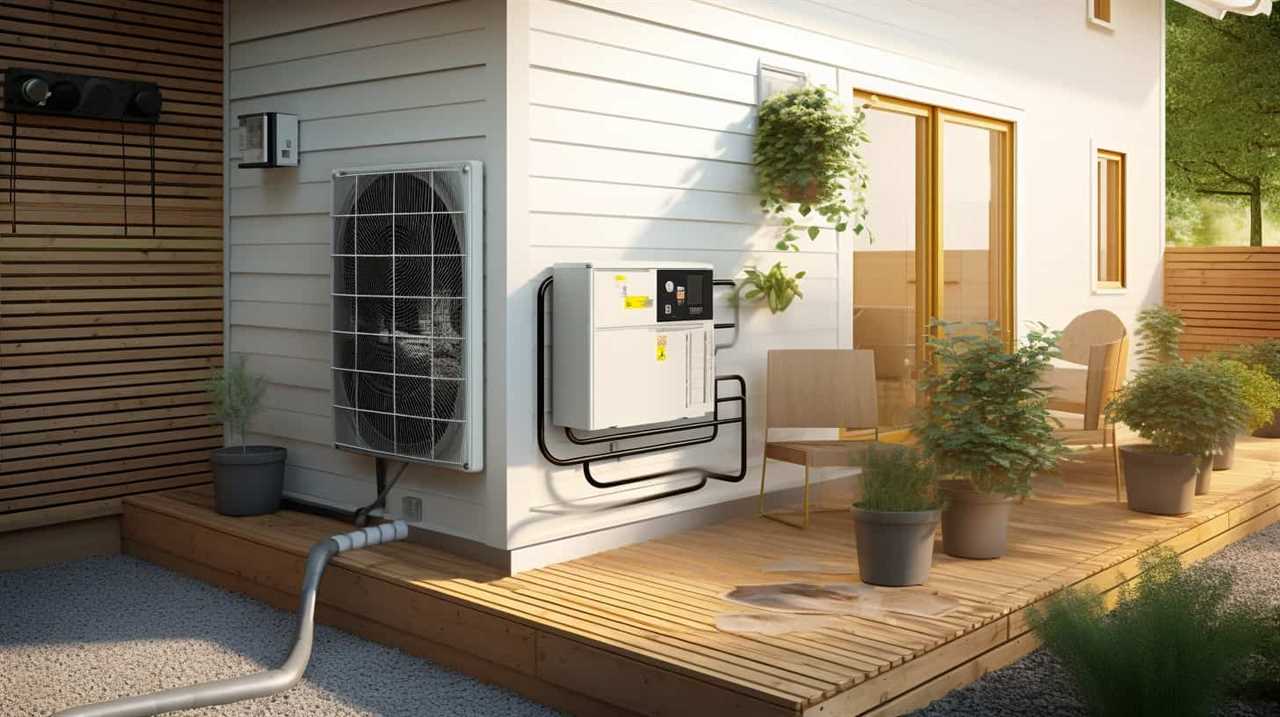
By following these guidelines, HVAC systems can achieve maximum energy efficiency.



